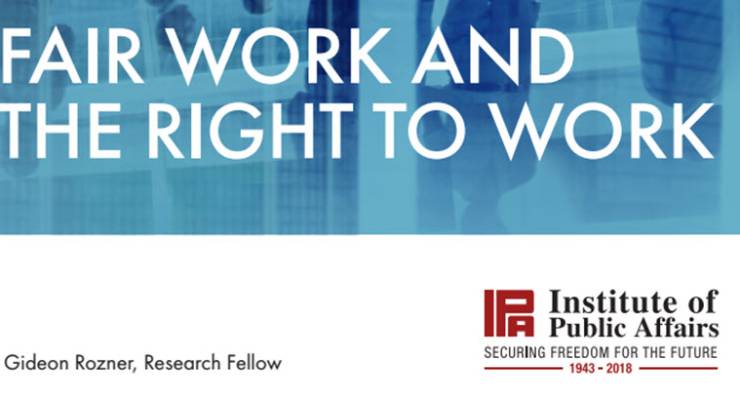
Did you know the Fair Work Act is strangling business and wage growth is out of control? You might have read something like that in a recently released report from the Institute of Public Affairs, glowingly reported on page 4 of Monday’s Australian. IPA research fellow and report author Gideon Rozner focuses on unfair dismissal applications, which have increased — a predictable trend after the act scrapped the WorkChoices exemption on businesses with fewer than 100 employees. But there were some very odd omissions in the report, and always keen to help out our IPA frenemies, we will now correct the record.
IPA claim: wage growth is unsustainable
Possibly the most remarkable point in the report accuses the modern award system of entrenching “unsustainable wage growth” through “creep” in pay and allowances. And yet the consensus is that wage growth is at record lows. If record lows are unsustainable, what does sustainable look like? In addition (and also not in the IPA report), Fair Work Commission president Iain Ross said the increased minimum wage, announced earlier this month, would not lift minimum wage workers out of poverty.
However, Rozner was adamant, telling Crikey: “As a whole, pay and allowances under Fair Work have risen at a rate which has created economic barriers that keep disadvantaged and unskilled people out of the workforce. In particular, centralised wage fixing via the ‘modern’ award system is resulting in the constant ‘creep’ upwards in pay and allowances that are becoming unsustainable for many industries.”
IPA claim: penalty rates are strangling small business
The report details the onerous penalty rates imposed by the Fast Food Workers Award and says penalty rates are harming the retail and hospitality sectors:
“The barriers to enterprise bargaining have deprived small businesses of the flexibility to pare back award conditions that prevent them from hiring additional workers, such as penalty rates. This particularly affects sectors such as retail and hospitality, which would otherwise be well-placed to offer employment to relatively disadvantaged job-seekers, such as people with little prior experience or education.”
Rozner says the Institute of Public Affairs welcomes Fair Work’s February decision to cut weekend penalty rates, but he says it did not go far enough.
“However, as the IPA said at the time, ‘a fairer way would be to let individuals decide their own penalty rates,” he said. “A fairer work system would allow individual employees and employers to come to their own arrangements about pay and conditions.”
Far from withering because of onerous penalty rates, however, the hospitality sector is employing more people than ever. Those statistics were not available until yesterday, but way back in 2015 Crikey pointed out that the hospitality sector was booming, despite the stranglehold of paying people more on the weekends.
IPA claim: unions have too much power
The report concludes with the traditional IPA grievance that the Fair Work Act gives far too much power to unions, returning them to the “heart of industrial relations”, and that it gives them too much power to “rent seek”. However, industrial action has been trending downward over the last five years — and 10 years, and beyond. The conditions that must be met for a union to legally strike are almost as strict as they were under WorkChoices.
As Crikey has previously reported, almost all the barriers to protected strike action remain in place. Strikes are prohibited except in the case of negotiating an agreement — regardless of whether a workplace has widespread safety concerns or a culture of sexual harassment or bullying. While the FWA has given more symbolic power to unions — the requirement for “good faith bargaining”, for example — it has not given them any ammunition to act on that power. There are also plenty of non-union agreements, which were most likely written without any union involvement at all.
“It is untrue to say that the scope for industrial action is ‘almost as limited’ as it was prior to Fair Work,” Rozner countered. “Because of the expansion of permissible content in enterprise bargaining agreements, unions can now take industrial action on a much wider range of matters.”








What do you expect from that “completely unbiased” group, the Eye Pee Alot.
I’m beginning to think that the IPA is doing extraordinary good work in it’s efforts to unseat the LNP government.
GetUp! is so diabolical, compared to the IPA, how ……?
IPA loves the free market approach to … well everything. And preferably just like America, where people die through lack of medical care and wages are as low as $2/hour (yes, plus tips, but without healthcare). What on earth drives these people, what is their view of this country in the future? The way America is going, its only time before there’s another civil war.
To be fair, to write for the IPA and its big brother downmarket pleb sheet, the Oz, all statements & claims are required not just to be risible but totally & demonstrably untrue.
What other purpose do either serve except to provide the sentient with a good laugh?